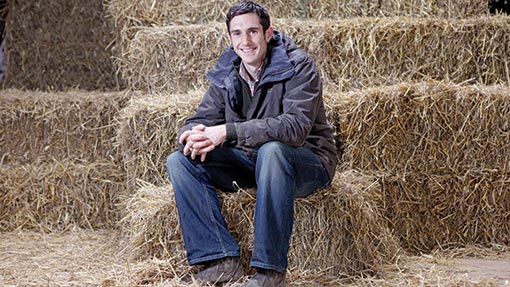Farmers Weekly Young Farmer of the Year 2014: Marc Jones

Marc Jones
Trefnant Hall Farm, Powys
A fact-finding mission to New Zealand was the catalyst for a radical restructuring of the sheep flock and heifer-rearing unit on this Welsh hill farm.
Sheep farmer Marc Jones, 31, saw how innovative New Zealand lamb production systems could be adapted to the UK while he was on a scholarship tour in 2009.
Organised by Hybu Cig Cymru (Meat Promotion Wales), the scholarship proved to be a seminal moment in Marc’s farming career. He saw how the abolition of subsidies had forced New Zealand farmers to cut costs and increase productivity.
“Marc’s attention to detail and pragmatic approach to common sense, good husbandry and exemplary farm management serves as an example and inspiration for all progressive farmers”
Mike Gooding, managing director, FAI Farms, and independent judge
They did this by maintaining a late-lambing, grass- and forage-based outdoor system. Lambing later allowed ewes to graze good-quality pasture and removed the need for housing and concentrates.
Marc returned home and told his father David, with whom he farms in partnership at Trefnant Hall Farm, near Welshpool, that they should convert the sheep unit from an inside-lambing, intensive 1,200 Welsh Mule enterprise to a low-maintenance, outdoor system.
The Welsh Mules were swapped for Lleyns as an “easy-lambing and maternal breed” while swedes were selected as a cheap, high-energy, low-protein forage crop. The swedes are direct drilled into sprayed-off pasture in early July for the sheep to graze from Christmas until early March.
Farm Facts
- 200ha (180ha usable)
- 300 outwintered dairy heifers
- 1,150 sheep, mostly Lleyn ewes
- Lambs sold deadweight via Dunbia to Sainsbury’s through Wales YFC scheme
Winning Ways
- Very clear market strategy for both heifers and lambs
- Exceptional rejuvenation policy of grassland in the hills
- Adoption of outwintering heifers based on NZ systems
- Profitable business even without SFP
- Constantly challenges himself to do better with new ideas
The direct drilling also helps lock in carbon and prevent soil erosion on the farm’s steep, free-draining ground over rock. In early March, sheep are moved on to spring grass for three weeks to settle ahead of lambing in early April. The ewes receive no additional feed prior to lambing.
The swedes are cheap to grow and have cut wintering costs from £25 to £4.75 a ewe. For the remainder of the year, sheep are rotationally grazed, with grass measurements taken weekly and mob grazing used to keep constant fresh growth ahead of the stock.
The Lleyn ewes achieve a lambing percentage of 170-180%, which returns “high output for low costs”, says Marc, who also works part-time at Adas as a farm business consultant. Most lamb is sold deadweight to Sainsbury’s as part of Wales’ Young Farmers Club’ Lamb Initiative, which pays a premium for hitting spec of 10p/kg plus £1 a lamb.
Marc has also restructured the cattle business by selling the herd of 120 Limousin suckler cows and providing a heifer-rearing service instead. Three hundred heifers are kept throughout the year and outwintered in a contract with the Sansaw Estate in Shrewsbury.
The changes have transformed the farm’s finances. In 2012-13, operating profit reached £131,280, up from £82,374 in 2011-12.
Still drawing on his scholarship experience, Marc plans to boost profit to the point where he no longer depends on subsidies – in case the EU follows in the footsteps of the New Zealand government.
Finalists
 Julie Harvey
Julie Harvey
Narracombe Farm, Devon
Julie’s passion for breeding quality suckler cows and selecting the right genetics to suit her farm is the driving force behind this successful Devon beef production business, which returned a fantastic profit of almost £50,000 last year.
 Jamie Stokes
Jamie Stokes
Tythe Farm, Cambridgeshire
Jamie has introduced a new arable rotation to tackle blackgrass. He hopes control strategies, including grass leys, double break crops, fallows, spring cropping and black mustard, will help eliminate it within six years.
Sponsor’s message
 “Agriculture will always need a pool of young, innovative business people if we are to continue to deliver dynamic, responsive food production – and with finalists like these, the industry is in safe hands”
“Agriculture will always need a pool of young, innovative business people if we are to continue to deliver dynamic, responsive food production – and with finalists like these, the industry is in safe hands”
Graham Wilkinson, agriculture manager
